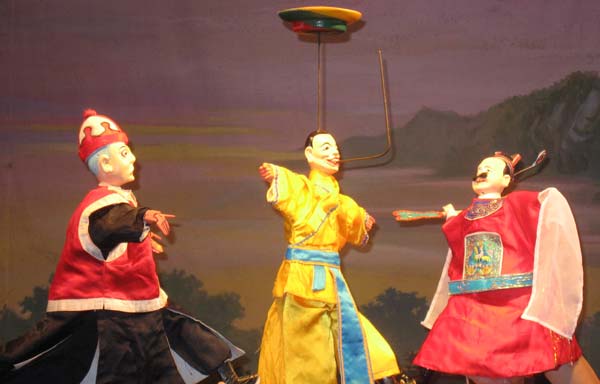
 |
|
A puppet spins a plate during Celebrating the Lantern Festival. Provided to China Daily |

London audiences following battles among Olympic athletes are in for another treat - witnessing stage fights among a dozen Chinese puppet characters.
Three puppeteers from Fujian province's Jinjiang Glove Puppet Troupe will stage a 10-minute show at London's Hackney Empire theater on Aug 9.
According to troupe leader Hong Shijian, the brief performance is part of the 2012 Chinese Youth London Olympics Carnival, a cultural exchange program initiated by the Chinese Young Pioneers Business Development Center. The organization has more than 100 performers specializing in a range of art forms such as opera, dance and martial arts.
Hong says the troupe was selected to perform in London because it has cemented its reputation of performing in many foreign countries, with rousing responses from viewers.
For the London stage, the organizers wanted a show which was "as vibrant and cheerful as possible", so Hong sorted through the repertoire and chose the piece, Celebrating the Lantern Festival.
"It depicts various scenes during traditional Chinese festivals, is action-packed and has a jolly musical accompaniment," Hong says.
"But it's also the most difficult glove puppet show for the performers because it contains complex movements such as lion dancing, plate spinning and jar juggling."
Citing the plate trick as an example, Hong says the performer, in an attempt to let the puppet catch the plate and spin it, must have one hand tossing a tiny wooden plate onto the head of the puppet, while using the other hand to control the puppet. He says a steel wire is inserted in the puppet's head to help with the spinning.
"It's hard enough for real acrobats to catch the plate, let alone puppeteers!" Hong says, adding that to prevent the plate from falling off requires intricate finger and palm movements, and a puppeteer has to practice for years to master the skill.
Despite his rich experience performing abroad, the 49-year-old veteran puppet show artist says he feels way more excited because this time it is against the background of the London 2012 Olympic Games this time.
"I've never been to London before, and I'm proud that now that I finally have such a chance to present puppetry to the whole world," Hong says.
Jinjiang glove puppetry started in the Jin Dynasty (AD 265-420) and developed rapidly during the Ming Dynasty (1368-1644), but the time-honored art form is still not widely known, Hong says.
Cai Meina, one of the performers and an award-wining puppeteer, admits she is slightly anxious.
"I feel really excited to perform at the Olympic Games. I can empathize with the pressure felt by those athletes," Cai says.
The 31-year-old says she has been putting in extra hours to practice and ensure a successful performance.
"The puppet show doesn't have dialogues but, foreign audiences will understand the facial expressions and the body language," says Cai.
She says the London performance is special - not only do the audiences get to see the puppets act on stage, they will get to witness the skills of the puppeteers as they use one hand to control a sword-wielding character to fight another armed puppet.
"I'm sure the interaction will wow the audience," adds Cai.
sunli@chinadaily.com.cn